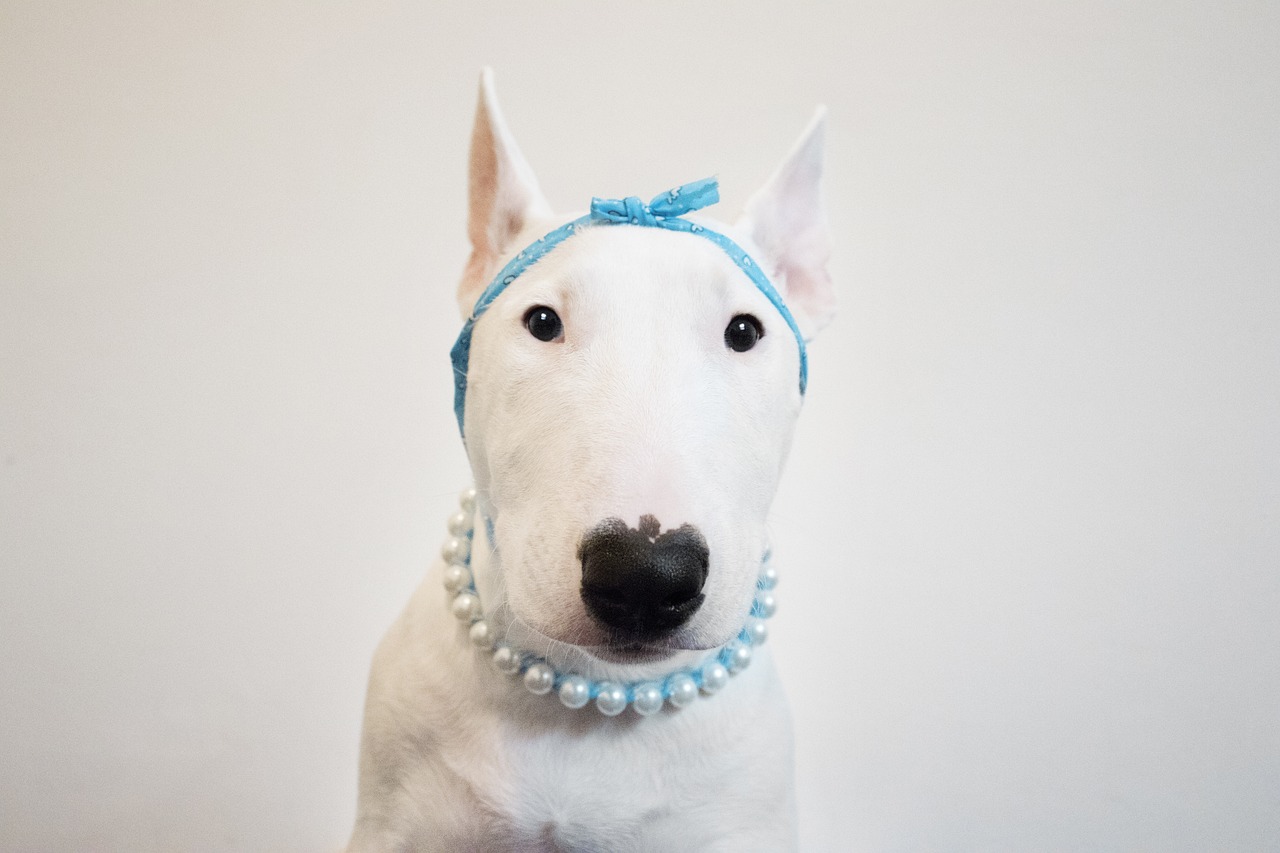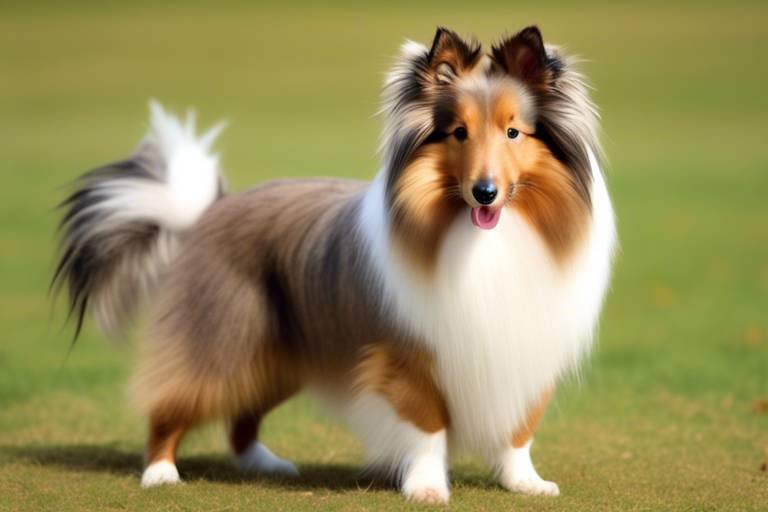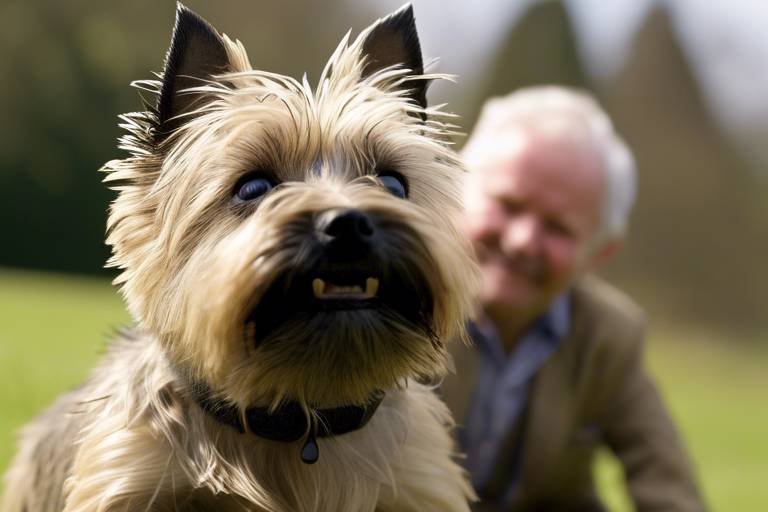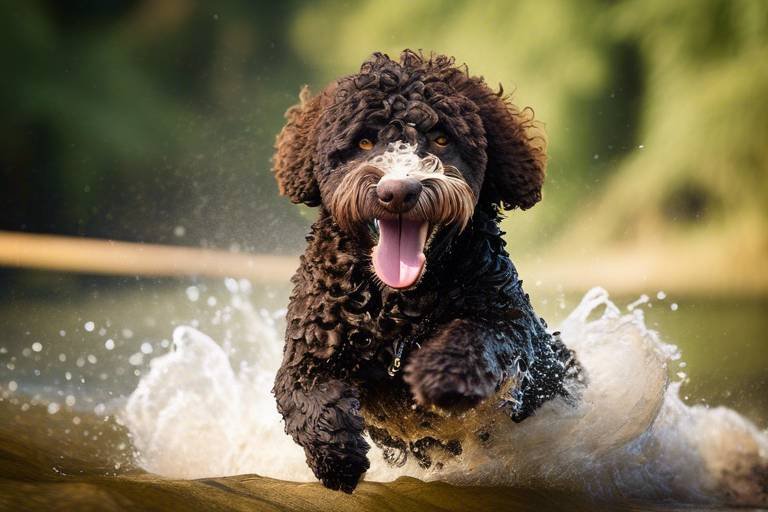The Characteristics of the Boston Terrier - Compact and Lovable
This article explores the unique traits and qualities of the Boston Terrier, a breed known for its compact size, friendly demeanor, and adaptability as a companion animal. If you're considering adding a furry friend to your family, the Boston Terrier might just be the perfect fit! These delightful little dogs are not only adorable but also bring a wealth of joy and companionship to their owners. Let's dive into what makes these dogs so special and why they have captured the hearts of many.
Boston Terriers are recognized for their distinctive looks, featuring a tuxedo-like coat, large expressive eyes, and a compact frame. Their physical attributes contribute to their charm and appeal as a beloved breed. With their short snouts and flat faces, they possess a unique appearance that many find irresistible. Their coat can come in various colors, including black, brindle, and seal, often accented with white markings that enhance their tuxedo-like appearance. It's hard not to smile when you see a Boston Terrier strutting their stuff!
Known for their friendly and lively nature, Boston Terriers are affectionate companions. Their playful demeanor makes them great family pets, and they often form strong bonds with their owners. Imagine coming home after a long day to a wagging tail and a happy face waiting at the door! These dogs thrive on human interaction and are known for their loving personalities. They are often described as clowns due to their playful antics, which can bring laughter and joy to any household.
Boston Terriers are social dogs that thrive on interaction with people and other pets. Their sociable nature makes them well-suited for families and individuals alike, fostering a loving home environment. They love to be the center of attention and will often seek out opportunities to engage with their human companions. Whether it's cuddling on the couch or playing fetch in the backyard, these dogs are happiest when they are with their loved ones.
Boston Terriers are generally good with children, exhibiting patience and playfulness. Their gentle disposition makes them ideal companions for kids, promoting a joyful family dynamic. They are known to be tolerant and affectionate, often joining in on the fun during playtime. However, it's always important to supervise interactions between dogs and young children to ensure a safe and positive experience for everyone involved.
These dogs typically get along well with other animals, showcasing their adaptable and friendly personality. Proper socialization can enhance their relationships with fellow pets in the household. Early exposure to different pets can help Boston Terriers develop good social skills, making them a harmonious addition to multi-pet families. They often enjoy the company of other dogs and even cats, provided they are introduced in a positive manner.
Boston Terriers possess moderate energy levels, requiring regular exercise to stay healthy and happy. Daily walks and playtime are essential for maintaining their physical and mental well-being. While they may not need hours of vigorous exercise, a good romp in the yard or a stroll around the neighborhood is essential to keep their spirits high. Think of them as the perfect balance between a couch potato and an energetic playmate!
Boston Terriers are intelligent and eager to please, making them relatively easy to train. Positive reinforcement techniques work best for this breed, ensuring a productive and enjoyable training experience. Whether you're teaching them basic commands or fun tricks, their willingness to learn will impress you. Consistency and patience are key, and soon you'll find yourself with a well-behaved companion who loves to show off their skills!
Teaching basic commands to Boston Terriers can be a fun and rewarding process. Their quick learning ability allows them to master essential commands with consistent practice and encouragement. Commands like sit, stay, and come can be taught in no time, especially when paired with treats and praise. It's a fantastic way to bond with your furry friend while ensuring their safety and obedience.
For those looking to challenge their Boston Terrier further, advanced training can enhance their skills and strengthen the bond between dog and owner. Engaging activities keep them mentally stimulated and happy. Consider activities like agility training or even dog sports, which can provide a fun outlet for their energy and intelligence. Your Boston Terrier will love the challenge, and you'll both enjoy the time spent together!
- Are Boston Terriers good for first-time dog owners?
Yes! Their friendly nature and adaptability make them great companions for first-time owners. - Do Boston Terriers shed a lot?
Boston Terriers have short coats and are considered low shedders, making grooming relatively easy. - How much exercise do they need?
Moderate exercise, such as daily walks and playtime, is sufficient to keep them happy and healthy. - Are they good with other pets?
Yes, with proper socialization, Boston Terriers can get along well with other animals.

Physical Appearance
The Boston Terrier is a breed that truly stands out in a crowd, thanks to its distinctive physical features that combine elegance with a dash of playfulness. These dogs are often affectionately referred to as "the American Gentleman" due to their tuxedo-like coat, which is primarily black and white. This unique coloration not only adds to their charm but also makes them easily recognizable. Imagine a little dog dressed for a formal event, complete with a bowtie—that’s the Boston Terrier for you!
One of the most striking aspects of the Boston Terrier's appearance is their large, expressive eyes. These round windows to their soul convey a range of emotions, from sheer joy to curiosity, and they can melt even the coldest of hearts. Their eyes are often dark and set wide apart, giving them an alert and intelligent expression. This breed also features a short, square muzzle, which contributes to their adorable, compact face. When you look at a Boston Terrier, you can’t help but feel a sense of warmth and affection.
In terms of size, Boston Terriers are compact and muscular, typically weighing between 10 to 25 pounds and standing about 15 to 17 inches tall at the shoulder. Their sturdy build makes them robust yet agile, allowing them to be playful without being overly clumsy. The breed's short, smooth coat is easy to maintain, requiring minimal grooming. A quick brush now and then will keep their coat looking sharp and shiny.
Here’s a quick overview of their physical traits:
| Characteristic | Description |
|---|---|
| Coat Color | Black and white, brindle, or seal |
| Eye Shape | Large and round |
| Muzzle | Short and square |
| Size | 10 to 25 pounds |
| Height | 15 to 17 inches |
Overall, the Boston Terrier's is a harmonious blend of charm and strength. Their compact size makes them perfect for apartment living, while their friendly demeanor and adorable looks make them a favorite among dog lovers. Whether they are strutting their stuff on a walk or snuggling up on the couch, Boston Terriers are sure to turn heads and win hearts wherever they go.

Temperament
When it comes to the Boston Terrier, their temperament is truly one of their most endearing qualities. These dogs are known for their friendly and lively nature, making them not just pets, but cherished family members. Imagine a small bundle of joy, always ready to greet you with a wagging tail and a playful bark. They thrive on human interaction and are naturally inclined to form strong bonds with their owners. This breed's affectionate demeanor is often compared to that of a child's best friend, always eager to play and cuddle.
Boston Terriers are not just playful; they are also incredibly social. They love being around people and other pets, which makes them perfect companions for families and individuals alike. Their sociable nature means they often seek out attention and affection, making them great icebreakers at gatherings. Picture this: a Boston Terrier bouncing around, charming everyone with their goofy antics and big, expressive eyes. It's hard not to smile when they're around!
Another remarkable trait of Boston Terriers is their patience and gentleness, especially when interacting with children. They have a natural affinity for kids, often exhibiting a playful spirit that encourages laughter and joy in the household. Their ability to adapt to various environments and situations makes them ideal companions for families. Whether it’s a game of fetch in the backyard or snuggling on the couch during movie night, Boston Terriers are always up for the task!
Moreover, their friendly disposition extends beyond just humans; they typically get along well with other pets too. With proper socialization from a young age, these dogs can develop strong friendships with fellow furry companions. This adaptability is one of the reasons why they fit seamlessly into many different types of households. It’s like having a little ambassador of joy that brings everyone together!
In summary, the temperament of a Boston Terrier is a delightful blend of affection, playfulness, and social charm. They are not just dogs; they are companions that fill your life with happiness and warmth. Their ability to connect with people and other pets alike makes them a beloved choice for many. If you’re looking for a furry friend that embodies joy and companionship, look no further than the Boston Terrier!
- Are Boston Terriers good with children?
Yes, Boston Terriers are generally very good with children. They are known for their patience and playful nature, making them ideal companions for kids.
- Do Boston Terriers get along with other pets?
Absolutely! Boston Terriers are social dogs and typically get along well with other animals, especially when properly socialized.
- How much exercise do Boston Terriers need?
Boston Terriers have moderate energy levels and require regular exercise, like daily walks and playtime, to stay healthy and happy.
- Are Boston Terriers easy to train?
Yes, they are intelligent and eager to please, making them relatively easy to train with positive reinforcement techniques.
Social Behavior
Boston Terriers are truly the life of the party! Their social nature makes them one of the most amiable breeds you'll encounter. Whether it’s a family gathering or a casual stroll in the park, these little bundles of joy thrive on interaction. Imagine a small dog, tail wagging furiously, greeting everyone with enthusiasm—this is the Boston Terrier experience! They possess an innate ability to connect with people, making them perfect companions for families and individuals alike.
One of the most charming aspects of their social behavior is their affectionate demeanor. Boston Terriers are known to form strong bonds with their owners, often following them around the house like little shadows. They love to be included in family activities, whether it’s lounging on the couch during movie night or joining in on outdoor games. Their playful antics and loving nature foster a warm and joyful atmosphere, making them an integral part of the family dynamic.
Moreover, Boston Terriers are generally friendly towards other pets. They exhibit a remarkable adaptability that allows them to coexist peacefully with cats and other dog breeds. However, proper socialization is key to enhancing their relationships with fellow pets in the household. Early exposure to different animals can help them develop a well-rounded personality. Here’s a quick overview of how Boston Terriers interact with other pets:
| Pet Type | Interaction Style | Tips for Harmony |
|---|---|---|
| Cats | Curious and playful | Introduce slowly and supervise interactions |
| Other Dogs | Friendly and sociable | Encourage play dates and group walks |
| Small Animals | Variable; cautious | Monitor interactions closely |
In conclusion, the social behavior of Boston Terriers is a beautiful blend of affection, playfulness, and adaptability. Their ability to connect with humans and other pets alike makes them a beloved choice for many households. So, if you’re considering adding a Boston Terrier to your family, get ready for a lifetime of love, laughter, and unforgettable moments!
- Are Boston Terriers good with children?
Yes, Boston Terriers are generally very good with children and exhibit a playful and patient demeanor. - How much exercise do Boston Terriers need?
They require moderate exercise, including daily walks and playtime, to stay healthy and happy. - Do Boston Terriers get along with other pets?
Yes, with proper socialization, they typically get along well with other animals. - Are Boston Terriers easy to train?
Yes, they are intelligent and eager to please, making training relatively easy with positive reinforcement methods.
Compatibility with Children
When it comes to family pets, the Boston Terrier truly shines, especially in homes with children. These delightful dogs are known for their gentle and playful nature, making them fantastic companions for kids. Imagine a small, energetic friend who is always ready for a game of fetch or a cozy cuddle on the couch—this is precisely what a Boston Terrier brings to the table. Their affectionate demeanor means they often seek out the company of children, relishing the opportunity to engage in playful antics that can keep both parties entertained for hours.
One of the standout traits of Boston Terriers is their patience. Children, with their boundless energy and occasional clumsiness, can sometimes be overwhelming for a dog. However, Boston Terriers tend to handle these situations with grace. They are not easily irritated and often enjoy the rough-and-tumble play that comes with being around kids. This makes them a great choice for families who want a dog that can keep up with the hustle and bustle of daily life.
Moreover, Boston Terriers are quite adaptable. They can thrive in various living situations, whether in a bustling household or a quieter setting. Their moderate size makes them suitable for both small apartments and larger homes, as they don’t require vast amounts of space to be happy. However, it's crucial to remember that supervision is always a good idea when dogs and young children interact. Teaching children how to properly approach and play with their furry friends can foster a sense of responsibility and respect for animals.
In terms of socialization, Boston Terriers generally get along well with other pets, which can be an added bonus for families with multiple animals. This sociable nature not only enhances their compatibility with children but also promotes a harmonious household. With proper training and exposure, Boston Terriers can learn to coexist peacefully with various pets, creating a lively and loving family environment.
In summary, if you're considering adding a Boston Terrier to your family, you can expect a loyal and loving companion who will not only fit in with your children but also enrich their lives. The joy of watching a Boston Terrier and a child grow up together is truly a heartwarming experience, filled with laughter, love, and unforgettable memories.
- Are Boston Terriers good with young children? Yes, Boston Terriers are known for their gentle and playful nature, making them great companions for children.
- How should I introduce my Boston Terrier to my kids? Always supervise interactions and teach children how to approach and play with the dog gently.
- Can Boston Terriers live with other pets? Yes, with proper socialization, Boston Terriers usually get along well with other pets.
- What is the energy level of a Boston Terrier? They have moderate energy levels and enjoy regular playtime and walks.
Interaction with Other Pets
Boston Terriers are known for their friendly and adaptable nature, which makes them excellent companions not only for humans but also for other pets. These little bundles of joy thrive in a sociable environment, and their playful demeanor often helps them forge strong bonds with their furry housemates. Whether it’s a cat lounging on the couch or another dog chasing a ball in the yard, Boston Terriers usually take it all in stride. Their curiosity and enthusiasm can lead to delightful interactions, but it’s essential to ensure that introductions are handled carefully.
When bringing a Boston Terrier into a home with existing pets, it’s crucial to consider the personalities involved. For instance, if you have a more dominant dog, a gradual introduction can help ease tension. Start by allowing them to sniff each other through a gate or a crate, then proceed to supervised play sessions. Positive reinforcement during these encounters can go a long way in building a harmonious household. Additionally, Boston Terriers are known for their non-aggressive nature, which generally makes them well-suited for multi-pet families.
Here are some tips to foster good relationships between your Boston Terrier and other pets:
- Supervised Introductions: Always supervise initial meetings to ensure safety and comfort.
- Positive Reinforcement: Use treats and praise to reward good behavior during interactions.
- Respect Boundaries: Allow each pet to have their own space and retreat areas.
- Regular Exercise: Keeping your Boston Terrier active can help reduce excess energy that might lead to unwanted playfulness with more reserved pets.
With proper socialization and patience, Boston Terriers can coexist beautifully with other animals. Their gentle disposition often encourages a playful yet respectful dynamic, making them a joy to have in a multi-pet household. So, if you’re considering adding a Boston Terrier to your family, rest assured that they can become a loving and integral part of your furry community!
Q: Are Boston Terriers good with cats?
A: Yes, Boston Terriers can get along well with cats, especially if they are introduced at a young age and given proper socialization.
Q: How should I introduce my Boston Terrier to other pets?
A: Start with supervised introductions in a neutral space. Allow them to sniff each other while keeping a close eye on their interactions.
Q: What if my Boston Terrier is aggressive towards other pets?
A: If aggression occurs, consult with a professional trainer to address behavioral issues and ensure safe interactions.
Q: Do Boston Terriers require a lot of exercise?
A: While they have moderate energy levels, regular exercise is important to keep them happy and well-adjusted. Daily walks and playtime are essential.
Energy Levels
Boston Terriers are known for their moderate energy levels, which makes them a delightful addition to any home. Unlike some breeds that require extensive hours of vigorous exercise, Boston Terriers strike a balance, needing just enough activity to keep them healthy and happy. This breed thrives on routine, and regular physical activity is essential for their overall well-being. A simple daily walk or a few rounds of fetch in the yard can do wonders for their energy levels.
It's crucial to understand that while Boston Terriers are not hyperactive, they are still playful and enjoy engaging in various activities. They love to run around, play with toys, and interact with their human companions. Their playful nature can sometimes lead to bursts of energy, where they might zoom around the house or yard, showcasing their spirited personality. To keep your Boston Terrier in peak condition, aim for at least 30 minutes to an hour of exercise each day. This can include:
- Short walks around the neighborhood
- Playtime in the backyard
- Interactive games that stimulate their mind
In addition to physical exercise, mental stimulation is equally important for Boston Terriers. These dogs are intelligent and curious, and they thrive on activities that challenge their minds. Engaging them in puzzle toys, teaching them new tricks, or even participating in dog sports can help keep their energy levels balanced. Remember, a bored Boston Terrier may resort to destructive behaviors, so keeping them entertained is key.
In summary, the energy levels of Boston Terriers are moderate but require regular exercise and mental stimulation to ensure they remain happy and healthy. By incorporating daily walks and interactive play into their routine, you can help your Boston Terrier live a fulfilling life, full of joy and vitality.
- How much exercise does a Boston Terrier need? Boston Terriers typically require about 30 minutes to an hour of exercise each day.
- Are Boston Terriers good for apartment living? Yes, their moderate energy levels make them well-suited for apartment living, as long as they get regular exercise.
- Do Boston Terriers enjoy playing with children? Absolutely! Boston Terriers are known for their playful and affectionate nature, making them great companions for kids.
- Can Boston Terriers be left alone for long periods? While they can tolerate some alone time, Boston Terriers thrive on companionship and should not be left alone for extended periods.

Training and Intelligence
When it comes to training, the Boston Terrier stands out as an exceptionally intelligent breed. Their eagerness to please their owners makes them relatively easy to train, which is a huge plus for both new and experienced dog owners. Imagine having a furry companion that not only understands your commands but is also excited to follow them! This breed thrives on positive reinforcement, so using treats, praise, and playtime as rewards can significantly enhance the training experience.
Boston Terriers respond well to a variety of training methods, but consistency is key. They can quickly pick up basic commands such as "sit," "stay," and "come," often mastering them in no time. For example, when teaching the "sit" command, you might find that your Boston Terrier catches on after just a few repetitions. Their quick learning ability makes training sessions both fun and rewarding, turning what could be a tedious task into an engaging activity for both dog and owner.
As they progress, many owners choose to delve into advanced training techniques. This can include agility training, tricks, or even obedience competitions. Engaging in these activities not only challenges their minds but also strengthens the bond between dog and owner. Think of it as a shared adventure where both of you learn and grow together. Moreover, advanced training keeps your Boston Terrier mentally stimulated, which is crucial for their overall happiness and well-being.
To give you a better idea of how training can evolve with a Boston Terrier, here’s a quick comparison of basic versus advanced training:
| Type of Training | Description | Benefits |
|---|---|---|
| Basic Training | Focuses on essential commands and house training. | Establishes good behavior and communication. |
| Advanced Training | Involves tricks, agility courses, and complex commands. | Enhances mental stimulation and strengthens the bond. |
In conclusion, the intelligence and trainability of Boston Terriers make them a fantastic choice for those looking to have a well-behaved and engaging companion. With the right approach, training can be a delightful experience that enriches both your life and that of your Boston Terrier.
- How long does it take to train a Boston Terrier? Training duration varies, but with consistent practice, basic commands can often be learned within a few weeks.
- Are Boston Terriers good for first-time dog owners? Absolutely! Their friendly nature and eagerness to please make them excellent companions for first-time owners.
- What training methods work best for Boston Terriers? Positive reinforcement methods, such as treats and praise, are most effective for this breed.
- Can Boston Terriers learn tricks? Yes, they are quite capable of learning tricks, and many owners enjoy teaching them fun and engaging activities.
Basic Commands
Teaching your Boston Terrier basic commands is not just a way to instill discipline; it's a fantastic opportunity to strengthen the bond between you and your furry friend. These little bundles of joy are known for their intelligence and eagerness to please, making them relatively easy to train. One of the best parts about training a Boston Terrier is how quickly they pick up on new commands. With consistent practice and positive reinforcement, you’ll be amazed at how fast they learn.
When starting out, it’s essential to create a positive training environment. Use treats, praise, and lots of enthusiasm to motivate your pup. Some of the fundamental commands you might want to focus on include:
- Sit: This is often the first command many owners teach. It’s simple and can be useful in various situations.
- Stay: Teaching your dog to stay in one place can help keep them safe and give you peace of mind.
- Come: This command is crucial for recall, especially in outdoor settings.
- Leave it: A vital command that helps prevent your dog from picking up something harmful.
As you work on these commands, remember that repetition is key. Short, frequent training sessions—around 5 to 10 minutes—are more effective than longer sessions that can lead to frustration for both you and your dog. And don’t forget to celebrate their successes, no matter how small! A simple “Good boy!” or a tasty treat can work wonders in keeping their spirits high.
Once your Boston Terrier has mastered the basics, you can start incorporating more advanced commands and tricks into your training routine. This not only keeps them mentally stimulated but also provides a fun way to engage with your pet. Advanced training can include commands like “roll over” or “play dead,” which can be entertaining for both you and your audience. The joy in seeing your Boston Terrier perform these tricks is truly priceless, and it fosters a deeper connection between you two.
Overall, the process of teaching basic commands to your Boston Terrier is not just about obedience; it’s about building trust and understanding. These training sessions are a fantastic way to communicate, and they can lead to a more harmonious relationship. So grab some treats, and get ready to have some fun while training your lovable companion!
Q: How long does it take to train a Boston Terrier basic commands?
A: The time it takes can vary, but with consistent practice, many Boston Terriers can learn basic commands within a few weeks. Regular short sessions are key!
Q: Are Boston Terriers stubborn when it comes to training?
A: While they can have a bit of a stubborn streak, their eagerness to please usually outweighs this. Positive reinforcement methods work best to keep them motivated.
Q: Can I train my Boston Terrier at home, or should I consider professional training?
A: You can certainly train your Boston Terrier at home! However, if you encounter challenges or want to learn more advanced techniques, a professional trainer can provide valuable guidance.
Advanced Training
When it comes to , Boston Terriers are not just cute faces; they are also intelligent and eager to learn. This breed thrives on mental stimulation, and engaging them in advanced training can be a fantastic way to keep their minds sharp and their spirits high. Think of it like giving them a puzzle to solve—something that challenges them and keeps them entertained. Whether it's agility training, tricks, or obedience competitions, Boston Terriers can shine if given the opportunity.
One of the best aspects of training these lovable companions is how much they enjoy the process. They love to please their owners, which makes them responsive to commands and eager to learn new skills. Advanced training can include a variety of activities, such as:
- Agility Training: This involves navigating obstacle courses and can be both fun and physically stimulating.
- Trick Training: Teaching them tricks like rolling over, playing dead, or even fetching specific items can be a great bonding experience.
- Obedience Competitions: Participating in competitions can give you and your Boston Terrier a sense of accomplishment.
It's essential to remember that training should always be a positive experience. Using positive reinforcement techniques—like treats, praise, and playtime—will help your Boston Terrier associate learning with fun. If you ever feel frustrated, take a step back and remember that patience is key. Just like us, dogs can have off days, and a little extra love and encouragement can go a long way.
Moreover, advanced training is not just about teaching your Boston Terrier new skills; it's also a fantastic way to strengthen the bond between you. As you work together, you create a shared language and understanding that enhances your relationship. So, whether you’re teaching them to weave through cones or jump over hurdles, you’re also building trust and respect.
Lastly, consider joining a local training class or finding an experienced trainer who specializes in positive reinforcement methods. This can provide you with valuable guidance and support, making the training process even more enjoyable. Remember, the journey of training your Boston Terrier can be as rewarding as the end result, so embrace the process and have fun!
Q: How long does it take to train a Boston Terrier?
A: Training duration varies based on the individual dog and the complexity of the commands. Generally, with consistent practice, you can expect to see progress within a few weeks.
Q: Can Boston Terriers learn advanced tricks?
A: Absolutely! Boston Terriers are intelligent and can learn a variety of advanced tricks, especially with positive reinforcement and regular practice.
Q: Is socialization important for Boston Terriers during training?
A: Yes! Socialization is crucial for Boston Terriers. It helps them become well-adjusted and confident dogs, making training easier and more effective.
Q: What should I do if my Boston Terrier isn’t responding to training?
A: If your Boston Terrier seems unresponsive, try changing your training methods. Incorporate more play, shorter sessions, or different rewards to keep them engaged.
Frequently Asked Questions
- What is the typical size of a Boston Terrier?
Boston Terriers are small dogs, typically weighing between 10 to 25 pounds and standing about 12 to 17 inches tall at the shoulder. Their compact size makes them perfect for both apartments and houses.
- Are Boston Terriers good with children?
Absolutely! Boston Terriers are known for their gentle and playful nature, making them great companions for kids. They are patient and enjoy playtime, fostering a joyful dynamic within the family.
- How much exercise do Boston Terriers need?
Boston Terriers have moderate energy levels and require regular exercise to stay healthy. Daily walks and play sessions are essential to keep them physically fit and mentally stimulated.
- Are Boston Terriers easy to train?
Yes! Boston Terriers are intelligent and eager to please, which makes training relatively straightforward. Using positive reinforcement techniques can enhance their learning experience and strengthen your bond.
- Do Boston Terriers get along with other pets?
Generally, yes! Boston Terriers are sociable and adaptable, often getting along well with other animals. Early socialization is key to fostering positive relationships with fellow pets.
- What is the lifespan of a Boston Terrier?
Boston Terriers typically live between 11 to 15 years. With proper care, regular vet check-ups, and a healthy lifestyle, they can enjoy a long and happy life.
- Do Boston Terriers shed a lot?
Boston Terriers have a short coat that sheds minimally, making them a good choice for those who prefer low-maintenance grooming. Regular brushing can help manage any loose hair.
- What health issues should I be aware of with Boston Terriers?
Like any breed, Boston Terriers can be prone to certain health issues, including brachycephalic airway syndrome, hip dysplasia, and eye problems. Regular vet visits and a healthy lifestyle can help mitigate these risks.



















